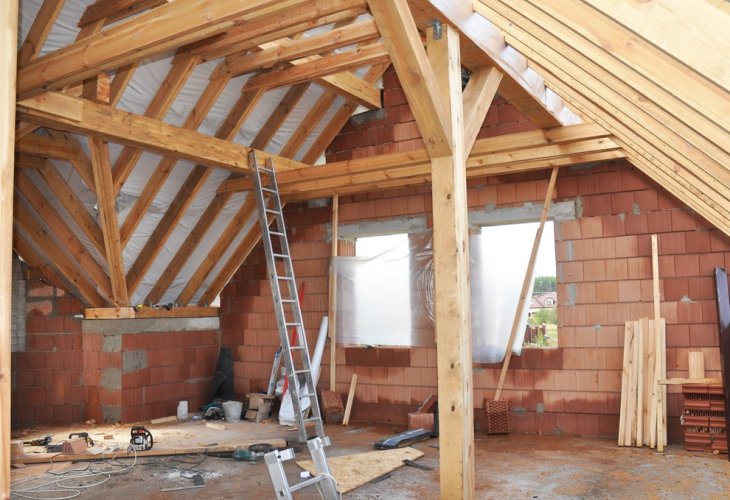Personal Stories
When Compassion Builds More Than Walls
When an elderly man moves in, he helps his neighbor build, not just a home, but peace and understanding.
 (Illustration: shutterstock)
(Illustration: shutterstock)The great Rabbi Reuven Karlenstein often shared this true story in his inspiring talks:
A Holocaust survivor who had made aliyah (immigrated to Israel) and lived in Herzliya moved to Bnei Brak in his old age.
On his second day in the new apartment, one of the veteran neighbors knocked on his door. “I want to let you know there’s a bit of a situation in our building,” the neighbor began. “One of the residents wants to renovate and expand his apartment. Naturally, we don’t agree. Construction means noise, dirt, and disturbance. But we don’t really have the power to stop him. Since you’re new here and elderly, you could claim that the noise and mess would be too much for you. That might help us stop the construction.”
“Who is this neighbor who wants to build?” the elderly man asked. The neighbor told him the name and apartment number. The elderly man thanked him politely, and after the neighbor left, he slowly gathered his seventy-five years of life and made his way up the stairs to visit the person they were trying to stop.
He knocked on the door. “Shalom, I’m your new neighbor from downstairs,” he said. “Yes, welcome! You just moved in from Herzliya, right?” the man replied. “May I come in?” asked the elderly man. “Of course,” said the neighbor, inviting him to sit down.
“I wanted to take a few minutes to get to know you,” said the elderly man. “How many years have you lived in this building? How many children do you have?”
The man explained that he and his wife had ten children, none yet married. Twelve people lived in their small apartment. “How many rooms?” the elderly man asked.
“Two and a half,” he answered. “They’re not small, and we manage. To be honest, we even put a mattress in the kitchen at night for sleeping. Baruch Hashem (thank God), we manage.”
“Why don’t you expand a bit?” asked the elderly man.
“I wanted to,” replied the neighbor. “But some people are against it, so I dropped the idea.”
“Why not try again?” “Because they won’t let me.”
“But if you could build, how would you pay for it?”
“I’d borrow from gemachs (free-loan funds),” he said, a bit embarrassed.
“In that case,” the elderly man said, “let me tell you something. I ran a large gemach in Herzliya. Go downstairs, fill out a form, and I’ll lend you three thousand dollars. You’ll need three guarantors. I want you to start.”
“It’s not about the money,” the man repeated. “The real problem is the opposition from neighbors.”
“Let me deal with that,” said the elderly man.
He left and knocked on the door of the objecting neighbor.
“How many children do you have?” he asked.
“Five, all married, thank God.”
“And how many rooms?”
“Two and a half, which I divided into three.”
“And upstairs,” the elderly man said with tears in his eyes, “there’s a family of twelve, sleeping with a mattress in the kitchen. And you won’t let them expand? Don’t you have any compassion? And not only that, you came to me asking me to block their plans too? To make me sin along with you?”
He paused and said gently but firmly: “We all need mercy in life. Without Hashem’s (God’s) mercy, life is bitter. If someone shows mercy to others, especially to neighbors, Hashem shows mercy to them. And if not, may Heaven have mercy on them.”
The neighbor was visibly moved. “You’re right,” he said, eyes welling with tears. “From today, I won’t interfere anymore.”
But the elderly man replied, “It’s not enough just to stay silent. The family still needs help. You need to go find him a gemach. Help him get the funds he needs. That’s real compassion.”
“What can I say?” the neighbor responded. “You leave me no choice. Fine, I’ll do as you say.”
“Wonderful,” said the elderly man. “Let’s go tell him.”
He returned to his home, brought a bottle of liquor, and together they went upstairs to the neighbor with the large family.
“We’ve come to drink l’chaim (a toast to life) because the neighbors are now supporting your building plans.”
They drank l’chaim together in the crowded home.
Rabbi Karlenstein would finish the story by sharing that within a month, the construction began. “This story is true exactly as I told it,” he would say, urging his listeners to learn from it the value of carrying another’s burden and acting with mercy.
“So many quarrels with neighbors come from jealousy,” Rabbi Karlenstein would add, his voice filled with pain. “I know someone who built 45 meters from the nearest neighbor, and still someone complained that the construction was ‘taking away his air.’ What air is it really taking? The air of goodness and understanding.”
Each of us has daily opportunities to show kindness with our money, our words, our actions. Even a small gesture can give someone strength and bring blessing into our own lives.
This story is recorded in the book Yechi Reuven, and is shared here thanks to the "Dirshu" website, for the benefit of the public.

